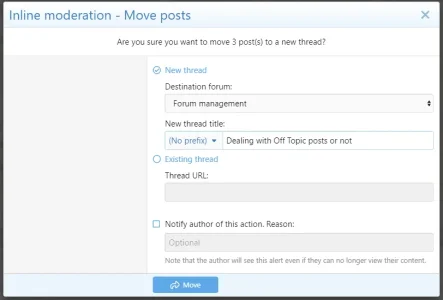Mr Lucky
Well-known member
Just wondering what people do when a thread gets (too many?) off topic posts.
I find there are generally two important perspectives: from admin POV and from thread starter POV. There’s is of course also the general member experience as well.
Some thread starters consider themselves thread owner, however I always consider the admin is because we are responsible for overall forum quality including both user experience and SEO. Both are necessary to survive and flourish.
I usually ignore the occasional one-off post that is often just (an attempt at) interjecting humour, I’m more interested in what happens when a OT post triggers a whole new discussion that goes off at a tangent.
If the tangent is totally different, I would often just move those posts to their own thread (but never quite sure whether the participants get notifications or do they have to specifically watch the new thread???)
But sometimes it's more complicated, so for example here is a current decision I need to make.
There is a discussion among residents about a proposed traffic scheme that would close off a high street to motor traffic and supposedly be better for cyclists, pedestrians, e-scooter etc. This huge implications because even though the idea is appealing for environmental reasons, people are concerned about where the through traffic will go and whether it means more on the residential streets...
All good so far, lot's of opinions, but then someone posts about the City's proven for cyclists in general and so the tangent discussion has gone away from the specific scheme into a whole big discussion about where is good or bad in the City to cycle.
So in one way it's irrelevant, in another it isn't.
NB: I don't mean to start a discussion about that., just using it as an example of something that I'm sure many of us get from time to time.
What's your opinions and how to deal with it?
I find there are generally two important perspectives: from admin POV and from thread starter POV. There’s is of course also the general member experience as well.
Some thread starters consider themselves thread owner, however I always consider the admin is because we are responsible for overall forum quality including both user experience and SEO. Both are necessary to survive and flourish.
I usually ignore the occasional one-off post that is often just (an attempt at) interjecting humour, I’m more interested in what happens when a OT post triggers a whole new discussion that goes off at a tangent.
If the tangent is totally different, I would often just move those posts to their own thread (but never quite sure whether the participants get notifications or do they have to specifically watch the new thread???)
But sometimes it's more complicated, so for example here is a current decision I need to make.
There is a discussion among residents about a proposed traffic scheme that would close off a high street to motor traffic and supposedly be better for cyclists, pedestrians, e-scooter etc. This huge implications because even though the idea is appealing for environmental reasons, people are concerned about where the through traffic will go and whether it means more on the residential streets...
All good so far, lot's of opinions, but then someone posts about the City's proven for cyclists in general and so the tangent discussion has gone away from the specific scheme into a whole big discussion about where is good or bad in the City to cycle.
So in one way it's irrelevant, in another it isn't.
NB: I don't mean to start a discussion about that., just using it as an example of something that I'm sure many of us get from time to time.
What's your opinions and how to deal with it?
